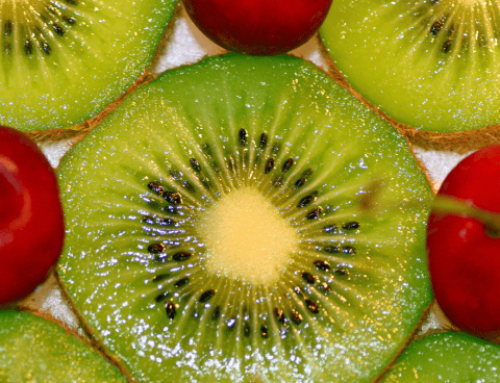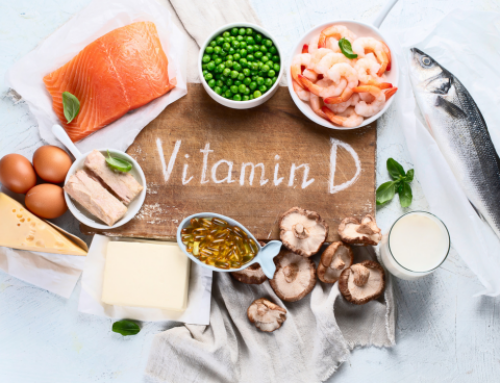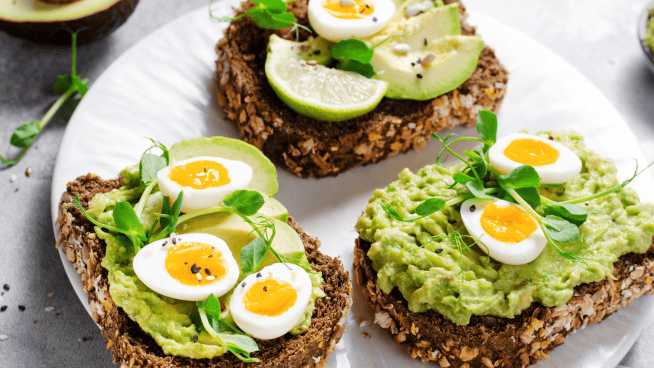Feed for Speed: 5 Foods and Supplements That Make You Faster
![]()
There are no real shortcuts if you want to get faster—you have to work hard and a dedicate yourself to training the right way. That said, there are things you can do besides working out that can aid you in your crusade for more speed. A number of foods and supplements have been found to have a positive effect on both how fast and how far an athlete can run.
Consuming the following foods and supplements will not make you fast if you don’t train hard. You can’t sit on your butt pounding beet juice all day and expect suddenly to turn into Usain Bolt. But when they’re coupled with a solid training routine and a smart overall approach to nutrition, they might just help you kick your speed into overdrive.
Beets/Beet Juice
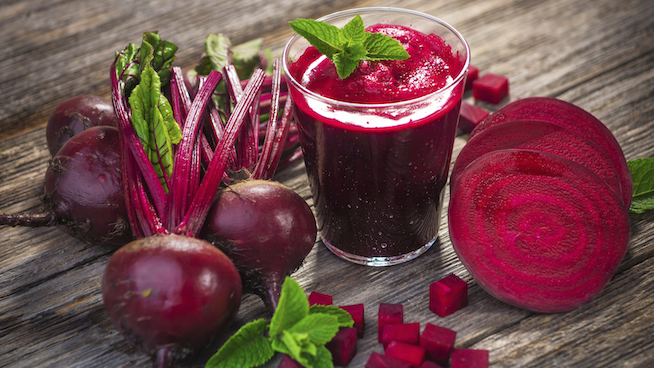
Beets are frequently touted for their ability to improve running performance. Most of the time, athletes consume beets in the form of beet juice—the liquid result of beets being put through a blender or juicer. From marathoners to soccer players to football teams, a wide-range of athletes have used beet juice in an effort to increase their performance. Some people say it tastes good, while others say it tastes like dirt. We’ll let you form your own opinion on the taste, but the fact is that beet juice has been proven to make athletes run faster and farther.
How? The main theory involves beets’ high concentration of natural nitrates. When we consume foods rich in nitrates, our body produces more nitric oxide, which increases blood flow, allowing us to use oxygen more efficiently. That means we’re able to run faster and longer than we would’ve before.
Although the exact reasons why beet juice improves running performance aren’t completely clear, several studies have found that it does make a significant difference. A 2012 study pitted two groups against each other in a 5k run. Seventy-five minutes before the run, one group consumed cranberry relish, and the other group consumed whole beetroot. Both foods were adjusted to provide the same amount of calories. The group that consumed whole beetroot ran 5 percent faster during the last mile of the run and clocked faster overall times than runners in the control group. A different study found that beet juice allowed athletes to perform roughly 15 percent longer in a cycle test to exhaustion.
Try downing a glass of beet juice every morning for a few days in a row and don’t be surprised if you feel a step faster!
Bananas
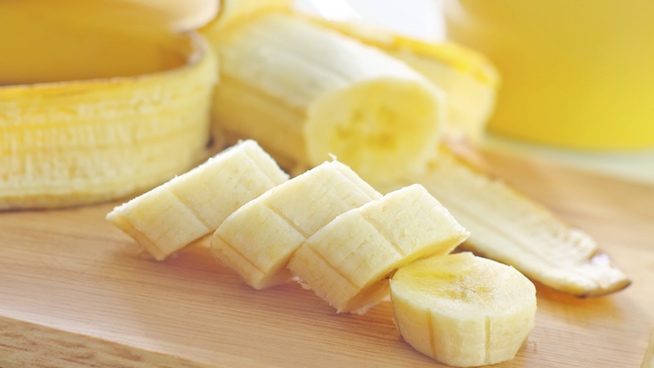
A wise man once said bananas are Mother Nature’s energy bar. Bananas are high in simple carbohydrates your body can quickly and efficiently turn into fuel for your workout.
One large banana contains roughly 31 grams of carbohydrates, making it a great choice for a pre-workout snack. Bananas are also high in potassium, one of the major electrolytes that help your body maintain a proper fluid balance and fend off dehydration. Being just a tiny bit dehydrated can cause your performance to take a nosedive, and a higher level of dehydration can result in severe issues like cramping. Ever tried to run a sprint when you’ve got leg cramps? Yeah, it doesn’t go well. Bananas help you avoid these situations.
A 2012 study found that bananas work as well as commercial sports drinks for replenishing athletes during high-intensity exercises. In the study, participants were asked to complete a 75-kilometer simulated road race on a cycling machine. Every 15 minutes, the cyclists consumed either half a banana or an amount of commercial sports drink that contained an equivalent amount of carbohydrates. The study concluded that “not only was performance the same whether bananas or sports drinks were consumed, there were several advantages to consuming bananas.”
Those advantages include more antioxidants, fiber and vitamin B6 than sports drinks and a healthier blend of sugars. It’s even been theorized that bananas’ status as a staple in the Jamaican diet could be a big reason why Jamaican sprinters are the fastest in the world. To sum it up, bananas can help you run faster and farther than almost any other food.
Salt
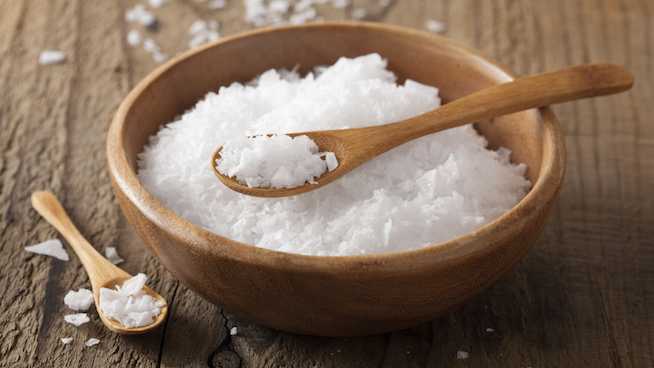
Salt can get a bad rap. Consuming too much salt can lead to high blood pressure and heart disease, and the fact that the average American eats more than twice the recommended amount of 1,500 milligrams a day causes many people to hit the panic button.
But here’s the deal—the amount of salt you need depends on the life you live. If you’re a couch potato who eats nothing but junk food, your salty snacks are probably harming you. But if you’re an active person who exercises intensely on a regular basis, salt is probably more your ally than your enemy. Salt (a.k.a., sodium) is an electrolyte, meaning it helps your body stay hydrated, and it also stimulates thirst, which can cause you to drink more water. Those are generally good things if you’re an athlete who works out intensely.
One study of salt and performance centered around two groups of athletes participating in the same triathlon. One group drank sports drinks and ingested salt capsules throughout the race, while the other group drank sports drinks and ingested placebos. The results were shocking—the group of athletes who ingested the salt capsules had an average time 26 minutes faster than the group who took the placebos.
A triathlon is obviously an endurance event, but a high-intensity workout, practice or game—especially one in hot summer conditions—can definitely drain your electrolytes and dehydrate you quickly. Including a salty snack before the game or at halftime can prevent dehydration and help you stay at a peak level of performance.
Caffeine
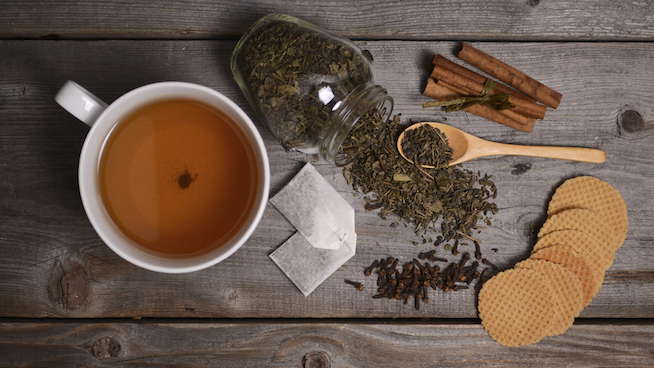
When it comes to speed-enhancing supplements, caffeine might be king. This plant product is the most widely used stimulant in the world. Beverages like coffee, soda and tea and foods like dark chocolate contain caffeine. There are also a surprising number of over-the-counter drugs and supplements that contain caffeine.
Exactly how caffeine improves performance can be confusing. Essentially, caffeine can prohibit the central nervous system from slowing down, which causes stimulation. The stimulant effect can fight fatigue, increase alertness, relax airways and increase heart rate. And contrary to a long-held popular belief, a moderate amount of caffeine or caffeinated beverages will not dehydrate you.
Hundreds of studies have demonstrated the performance-enhancing effects of caffeine. It’s been shown to increase short sprint speed, intermittent sprinting speed, endurance and even recovery.
Caffeine can certainly help you zoom around. But how much do you need? Too much can cause nasty side effects like anxiety and jitters. It’s been found that consuming between 3 and 5 mg of caffeine per 2.5 pounds of body weight can increase performance without health risks. If you’re trying to reap the performance-enhancing effects of caffeine, aim to consume it roughly an hour before your athletic event.
It’s also worth noting that caffeine is a banned substance by the NCAA—but only if your urine contains a level above 15 micrograms per milliliter, which is the equivalent of consuming 17 caffeine-containing soft drinks. Just be sure to stay away from the highly-concentrated caffeine supplements and be smart about your intake.
Vitamin D
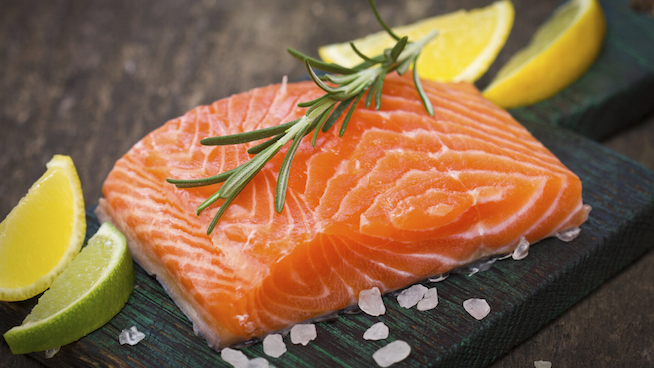
Vitamin D deficiency has been recognized as a “worldwide epidemic.” A deficiency in vitamin D can lead to several issues, such as compromised bone health and a higher risk for cancer and cardiovascular disease. Vitamin D also plays a crucial role in our ability to absorb calcium, which affects immune function, muscle strength, bone development and nerve signaling.
If it’s so important, why are so many people vitamin D-deficient? For one, not many foods contain it naturally. Fatty fish like salmon or mackerel are one of the few solid sources of vitamin D.
Although sunshine provides the body with vitamin D, many people who live in sun-soaked regions are deficient as well. Vitamin D’s effect on athletes hasn’t been as heavily researched as caffeine, but many studies have tied vitamin D levels to performance. The results of a study of the relation of elite soccer players’ performance and their vitamin D levels suggested that “vitamin D is related to the ability to perform efficiently during exercise.” Other studies involving movements like jumping and sprinting found that a vitamin D deficiency can significantly hinder performance.
It’s not known if an abundance of vitamin D can have performance-enhancing effects, but it does seem that vitamin D deficiency can hinder performance. Since vitamin
D deficiency is so prevalent, you should take steps to avoid it. For one, try getting outside during peak sun hours for at least an hour or two every week. Second, think about taking a vitamin D supplement. Any supplement containing between 400 and 600 IU of vitamin D can help you avoid deficiency and keep you on top of your game.
RECOMMENDED FOR YOU
Feed for Speed: 5 Foods and Supplements That Make You Faster
![]()
There are no real shortcuts if you want to get faster—you have to work hard and a dedicate yourself to training the right way. That said, there are things you can do besides working out that can aid you in your crusade for more speed. A number of foods and supplements have been found to have a positive effect on both how fast and how far an athlete can run.
Consuming the following foods and supplements will not make you fast if you don’t train hard. You can’t sit on your butt pounding beet juice all day and expect suddenly to turn into Usain Bolt. But when they’re coupled with a solid training routine and a smart overall approach to nutrition, they might just help you kick your speed into overdrive.
Beets/Beet Juice

Beets are frequently touted for their ability to improve running performance. Most of the time, athletes consume beets in the form of beet juice—the liquid result of beets being put through a blender or juicer. From marathoners to soccer players to football teams, a wide-range of athletes have used beet juice in an effort to increase their performance. Some people say it tastes good, while others say it tastes like dirt. We’ll let you form your own opinion on the taste, but the fact is that beet juice has been proven to make athletes run faster and farther.
How? The main theory involves beets’ high concentration of natural nitrates. When we consume foods rich in nitrates, our body produces more nitric oxide, which increases blood flow, allowing us to use oxygen more efficiently. That means we’re able to run faster and longer than we would’ve before.
Although the exact reasons why beet juice improves running performance aren’t completely clear, several studies have found that it does make a significant difference. A 2012 study pitted two groups against each other in a 5k run. Seventy-five minutes before the run, one group consumed cranberry relish, and the other group consumed whole beetroot. Both foods were adjusted to provide the same amount of calories. The group that consumed whole beetroot ran 5 percent faster during the last mile of the run and clocked faster overall times than runners in the control group. A different study found that beet juice allowed athletes to perform roughly 15 percent longer in a cycle test to exhaustion.
Try downing a glass of beet juice every morning for a few days in a row and don’t be surprised if you feel a step faster!
Bananas

A wise man once said bananas are Mother Nature’s energy bar. Bananas are high in simple carbohydrates your body can quickly and efficiently turn into fuel for your workout.
One large banana contains roughly 31 grams of carbohydrates, making it a great choice for a pre-workout snack. Bananas are also high in potassium, one of the major electrolytes that help your body maintain a proper fluid balance and fend off dehydration. Being just a tiny bit dehydrated can cause your performance to take a nosedive, and a higher level of dehydration can result in severe issues like cramping. Ever tried to run a sprint when you’ve got leg cramps? Yeah, it doesn’t go well. Bananas help you avoid these situations.
A 2012 study found that bananas work as well as commercial sports drinks for replenishing athletes during high-intensity exercises. In the study, participants were asked to complete a 75-kilometer simulated road race on a cycling machine. Every 15 minutes, the cyclists consumed either half a banana or an amount of commercial sports drink that contained an equivalent amount of carbohydrates. The study concluded that “not only was performance the same whether bananas or sports drinks were consumed, there were several advantages to consuming bananas.”
Those advantages include more antioxidants, fiber and vitamin B6 than sports drinks and a healthier blend of sugars. It’s even been theorized that bananas’ status as a staple in the Jamaican diet could be a big reason why Jamaican sprinters are the fastest in the world. To sum it up, bananas can help you run faster and farther than almost any other food.
Salt

Salt can get a bad rap. Consuming too much salt can lead to high blood pressure and heart disease, and the fact that the average American eats more than twice the recommended amount of 1,500 milligrams a day causes many people to hit the panic button.
But here’s the deal—the amount of salt you need depends on the life you live. If you’re a couch potato who eats nothing but junk food, your salty snacks are probably harming you. But if you’re an active person who exercises intensely on a regular basis, salt is probably more your ally than your enemy. Salt (a.k.a., sodium) is an electrolyte, meaning it helps your body stay hydrated, and it also stimulates thirst, which can cause you to drink more water. Those are generally good things if you’re an athlete who works out intensely.
One study of salt and performance centered around two groups of athletes participating in the same triathlon. One group drank sports drinks and ingested salt capsules throughout the race, while the other group drank sports drinks and ingested placebos. The results were shocking—the group of athletes who ingested the salt capsules had an average time 26 minutes faster than the group who took the placebos.
A triathlon is obviously an endurance event, but a high-intensity workout, practice or game—especially one in hot summer conditions—can definitely drain your electrolytes and dehydrate you quickly. Including a salty snack before the game or at halftime can prevent dehydration and help you stay at a peak level of performance.
Caffeine

When it comes to speed-enhancing supplements, caffeine might be king. This plant product is the most widely used stimulant in the world. Beverages like coffee, soda and tea and foods like dark chocolate contain caffeine. There are also a surprising number of over-the-counter drugs and supplements that contain caffeine.
Exactly how caffeine improves performance can be confusing. Essentially, caffeine can prohibit the central nervous system from slowing down, which causes stimulation. The stimulant effect can fight fatigue, increase alertness, relax airways and increase heart rate. And contrary to a long-held popular belief, a moderate amount of caffeine or caffeinated beverages will not dehydrate you.
Hundreds of studies have demonstrated the performance-enhancing effects of caffeine. It’s been shown to increase short sprint speed, intermittent sprinting speed, endurance and even recovery.
Caffeine can certainly help you zoom around. But how much do you need? Too much can cause nasty side effects like anxiety and jitters. It’s been found that consuming between 3 and 5 mg of caffeine per 2.5 pounds of body weight can increase performance without health risks. If you’re trying to reap the performance-enhancing effects of caffeine, aim to consume it roughly an hour before your athletic event.
It’s also worth noting that caffeine is a banned substance by the NCAA—but only if your urine contains a level above 15 micrograms per milliliter, which is the equivalent of consuming 17 caffeine-containing soft drinks. Just be sure to stay away from the highly-concentrated caffeine supplements and be smart about your intake.
Vitamin D

Vitamin D deficiency has been recognized as a “worldwide epidemic.” A deficiency in vitamin D can lead to several issues, such as compromised bone health and a higher risk for cancer and cardiovascular disease. Vitamin D also plays a crucial role in our ability to absorb calcium, which affects immune function, muscle strength, bone development and nerve signaling.
If it’s so important, why are so many people vitamin D-deficient? For one, not many foods contain it naturally. Fatty fish like salmon or mackerel are one of the few solid sources of vitamin D.
Although sunshine provides the body with vitamin D, many people who live in sun-soaked regions are deficient as well. Vitamin D’s effect on athletes hasn’t been as heavily researched as caffeine, but many studies have tied vitamin D levels to performance. The results of a study of the relation of elite soccer players’ performance and their vitamin D levels suggested that “vitamin D is related to the ability to perform efficiently during exercise.” Other studies involving movements like jumping and sprinting found that a vitamin D deficiency can significantly hinder performance.
It’s not known if an abundance of vitamin D can have performance-enhancing effects, but it does seem that vitamin D deficiency can hinder performance. Since vitamin
D deficiency is so prevalent, you should take steps to avoid it. For one, try getting outside during peak sun hours for at least an hour or two every week. Second, think about taking a vitamin D supplement. Any supplement containing between 400 and 600 IU of vitamin D can help you avoid deficiency and keep you on top of your game.


